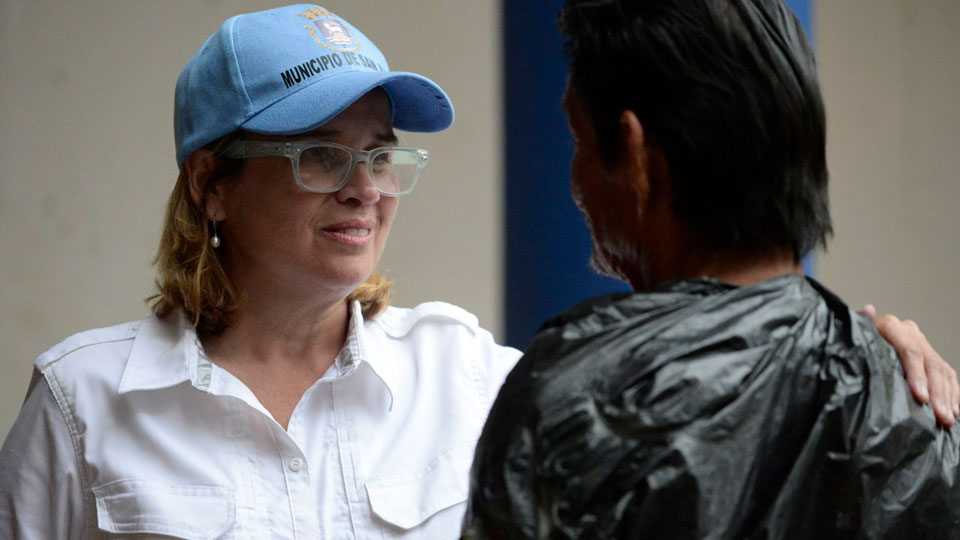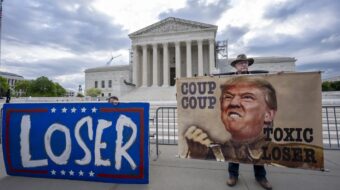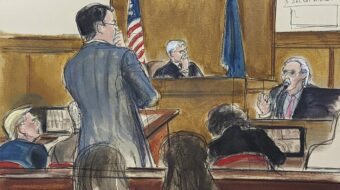
HOUSTON—Puerto Ricans, U.S. citizens whose homes, schools, hospitals, businesses and island were smashed by devastating Hurricane Maria last Sept. 20 – plus Hurricane Irma — are still “powerless” due to federal government inaction and indifference to their suffering, the Mayor of San Juan, Carmen Yulin Cruz Soto, says.
In videoed remarks from her city, the commonwealth’s capital, Cruz Soto declared 40 percent of the island’s 3.5 million residents still do not have electricity, months after the storm. And that’s not all.
Other reports put the real death toll from the hurricanes at more than 1,000 people, and damage at $95 billion and counting. And more than 30,000 people were added to the jobless rolls on an island already suffering from double-digit unemployment.
Cruz Soto described the conditions on Jan. 14 while accepting, by video, the Justice, Peace and Freedom Award at the AFL-CIO’s annual Martin Luther King commemorative conference, held this year in Houston. She headlined a list of honorees which also included union leaders and Texan battlers for human rights and civil rights.
“This award is not about me,” she told the 1,000 conference attendees. “This is about the 40 percent who do not have power – and who are powerless – even though all men and women are created equal.”
“You cannot pursue happiness when you are shackled in poverty,” the mayor declared.
Cruz Soto hit the national spotlight last year after the storms when she walked the devastated streets of her city and described how the Trump Administration, especially its Federal Emergency Management Agency, was and is failing Puerto Ricans. President Donald Trump himself came to the island later and drew scorn by throwing rolls of paper towels to a crowd.
Congress’ ruling Republicans have been no help, either. Past federal disaster relief legislation went through Capitol Hill without lawmakers demanding “offsets” – cuts elsewhere – before aid could flow. But Trump said Puerto Ricans “want everything given to them” and congressional Republicans have delayed the aid until they make those cuts.
And Trump has not been critical, nor has he demanded offsetting cut s, for aid for Texas and Florida, which Hurricane Maria also hit – and which he carried in the 2016 election. Puerto Ricans, as citizens of a commonwealth, not a state, can’t vote for president and don’t have voting representation in Congress.
The federal response has been so inadequate, Cruz Soto said, that the United Nations has declared it “a violation of human rights and the human condition.” Then she thanked the nation’s unions, who have also sent thousands of volunteers and tons of practical aid, to Puerto Rico.
“Help us and never forget us, because we still have a long way to go before we can say, as Dr. King did, ‘Free at last, free at last, thank God almighty, we’re free at last,’” Cruz Soto added.
By contrast, American Federation of Teachers Secretary-Treasurer Loretta Johnson told the crowd of results so far of the union’s Operation Agua, to get potable (drinkable) fresh water and water filtration systems to the island, where water as well as power was knocked out. Johnson said 3,849 water filters have been distributed to schools serving 270,000 students “and we’re halfway to our goal of 1.6 million filters for individual homes.”
Besides Cruz Soto, honorees included Bricklayers President Jim Boland, for his advocacy for legalization of undocumented people, Painters President Kenneth Rigmaiden, Sen. Catherine Cortez Musto, D-Nev., the first Latina U.S. senator in history, four notable Texans and Postal Workers Secretary-Treasurer Liz Powell.
One of the Texans, Harris County (Houston) Commissioner Rodney Ellis, then a state senator, led a 2011 Democratic flight from the legislature, preventing the quorum needed to pass a greatly gerrymandered GOP redistricting plan. The gerrymander deprived African-Americans and Latinos of political representation and influence, and the U.S. Justice Department later threw it out. The solons’ exit to Albuquerque, N.M., was part of Ellis’ 25-year career fighting for civil rights and equal rights.
Ellis, too, took a shot at Trump and the GOP, predicting his political defeat due to demographic trends in the Lone Star state – the nation’s second most-populous – and Houston, the fourth-largest U.S. city.
“If this county goes blue, this state goes blue,” Ellis said of Texas, which is now majority-minority, but where Anglos still have a population plurality. “And if we can carry Texas, the boy in the White House can go back to the s—hole he came from.”












Comments